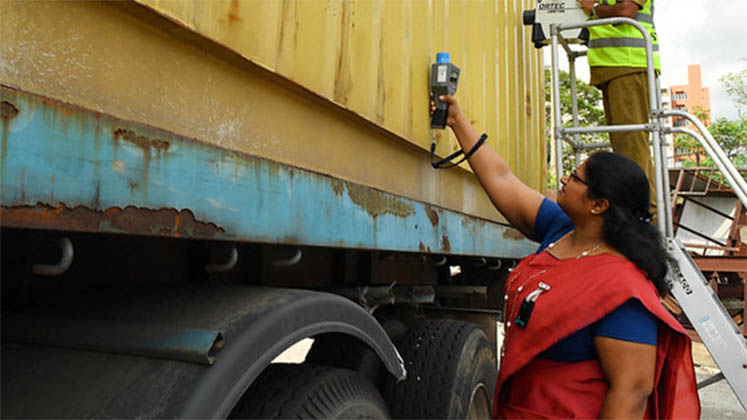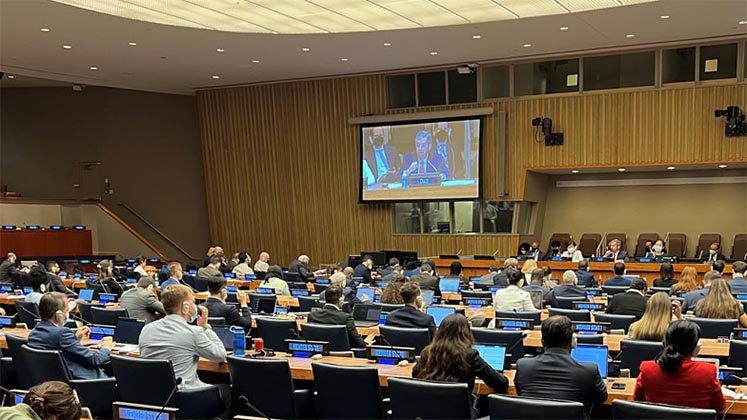28 November 2022
As Norway nears the end of its Security Council term, Ambassador Mona Juul reflects on efforts to connect the Women, Peace and Security (WPS) Agenda with work towards the implementation of Resolution 1540 (2004) on preventing non-state actors from obtaining access to weapons of mass destruction.
From the very first day of our term on the Security Council, 1 January 2021, Norway has made a top priority of the Women, Peace, and Security agenda, which promotes women’s full, equal, and meaningful participation and calls for the mainstreaming of gender perspectives in peace and security issues. We have partnered with 13 fellow Council members on a Statement of Shared Commitments to prioritise WPS implementation within the Council. Together, we are determined to advance the WPS agenda and ensure that the Council approaches WPS in a systematic way to help close the persistent gap between the rhetoric and the reality of women’s participation in peace and security, especially on the ground.
This approach is in line with the UN Secretary-General’s Agenda for Disarmament, in which he affirms that “empowering women and ensuring their equal and meaningful participation in disarmament and arms control decision-making processes can lead to more inclusive, effective and sustainable policy outcomes.” This is why we make the case that the international community should also seek out ways to bridge the gap between WPS and non-proliferation efforts. Women have a right to participate fully, equally, and meaningfully in all matters and at all levels of peace and security. This includes direct participation and influence on issues fundamental to their security and on decisions affecting their future. Inclusive processes also produce more sustainable solutions.

A Sri Lankan Scientific Officer inspects a shipping container to check for radioactive material (© IAEA, 2019).
We have worked collaboratively to ensure that Security Council mandates include language on WPS that is more detailed, more specific, and more comprehensive than ever before. One particularly important area here is work on implementation of Resolution 1540 (2004). This Resolution, with the help of the accompanying Security Council Committee (the 1540 Committee), aims to prevent non-state actors from obtaining access to weapons of mass destruction (WMD) and encourages enhanced international cooperation in this regard. The resolution also affirms that the proliferation of nuclear, chemical, and biological weapons and their means of delivery constitute a threat to international peace and security.
During the 1540 Committee’s Open Consultations, carried out in June 2022, Norway encouraged all delegates and participants to consider practical ways to enhance women’s participation and incorporate gender perspectives into the work of the 1540 Committee. Member States rose to the challenge, with several raising the issue in their national inputs to the upcoming mandate renewal, underlining that gender perspectives and considerations are an intrinsic and valuable element in the implementation of 1540.
On 30 November 2022, the Committee’s current ten-year mandate will come to an end. This critical moment in the future of the 1540 regime provides an opportunity to integrate the WPS Agenda into the work of the 1540 regime to a degree never seen before. We cannot afford to wait another ten years to promote women’s full, equal, and meaningful participation or the integration of gender perspectives into peace and security issues, including the non-proliferation of WMD to non-state actors.
Based on a recent non-paper developed in collaboration with Mexico, we propose the following issues for consideration:
1. Closing the gender gap in the work of the 1540 Committee
During the 1540 Committee’s Open Consultations, carried out in June, only 23 of 86 speakers in the general debate were women. This shows us that there is a clear lack of gender diversity in 1540-related processes.
Ensuring the full, equal, and meaningful participation of women at decision-making levels is central to harnessing diverse expertise, sharpening technical assistance, and building new areas for cooperation, capacity building, and training.

The Committee held its 91st Meeting from 31 May to 2 June 2022 at United Nations Headquarters in New York.
Increasing the diversity of experiences and perspectives in multilateral discussions and national implementation on Resolution 1540 is the smart thing to do, as research has shown that diversity triggers a more careful form of information processing that is often absent in homogenous groups.
For example, the activities of the 1540 Committee’s four working groups (monitoring and national implementation; technical assistance; international cooperation; and transparency and media outreach) offer robust opportunities to enhance interaction between the Committee, its Group of Experts, women practitioners and women’s organisations when developing strategies and policies to prevent the proliferation of WMDs and their means of delivery to non-state actors.
2. Applying a ‘WPS lens’ to the implementation of Resolution 1540
Applying a WPS lens to the implementation of UNSCR 1540 (2004) could be useful to assess if and how gender roles shape issues such as: exposure to risk; engagement with weapons; access to information and capacity-building; and the ability to access medical attention following a chemical, biological, radiological or nuclear incident. Additionally, a WPS perspective could enable a better understanding of differentiated impacts on women and girls stemming from the use of nuclear, biological, and chemical weapons. It could also shed light on connections between harmful masculinities and the acquisition, possession, or use of weapons of mass destruction.
There may be existing synergies between national action plans on WPS, Resolution 1540, and counter-terrorism that could be strengthened through adoption of this approach.
There are many ways for Member States who do not sit on the 1540 Committee to continue efforts to gender-mainstream work related to Resolution 1540. In national contexts, Member States can promote women’s full, equal, and meaningful participation on issues relevant to non-proliferation, including though increasing education and training opportunities for women working in 1540-related policy-making, planning, and implementation processes.
At the end of 2022, Norway‘s term on the Security Council will come to a close, and with it our time on the 1540 Committee. However, our commitment to the WPS agenda and to furthering effective non-proliferation will endure. We hope and trust that integrating gender perspectives and the full, equal, and meaningful participation of women into the broader work of the 1540 regime is something that Security Council members, Committee members, and Member States will continue to prioritise.
For our part, Norway will continue its efforts to promote gender equality and diverse participation in disarmament and non-proliferation processes right to the last day of our Security Council term – and certainly beyond.
Ambassador Mona Juul is Permanent Representative of Norway to the United Nations in New York. Previously, she served as Ambassador to the United Kingdom (2014-2018), Director General for Security Policy and the High North in the Ministry of Foreign Affairs (2011-2014), Ambassador/Deputy Permanent Representative at the Permanent Mission to the UN in New York (2005-2010), Chair of the 1st Committee of the 61st Session of the United Nations General Assembly (2006), among other roles.
